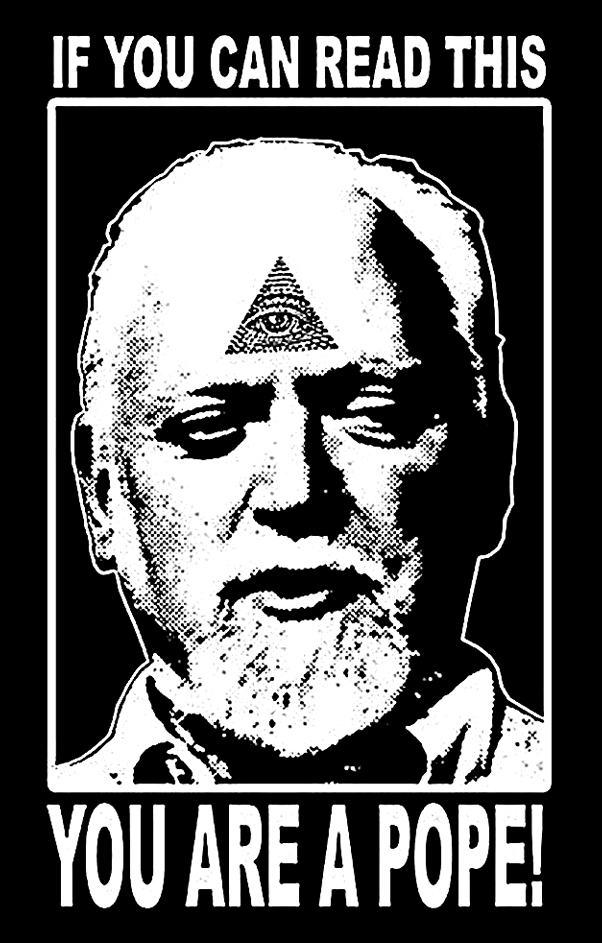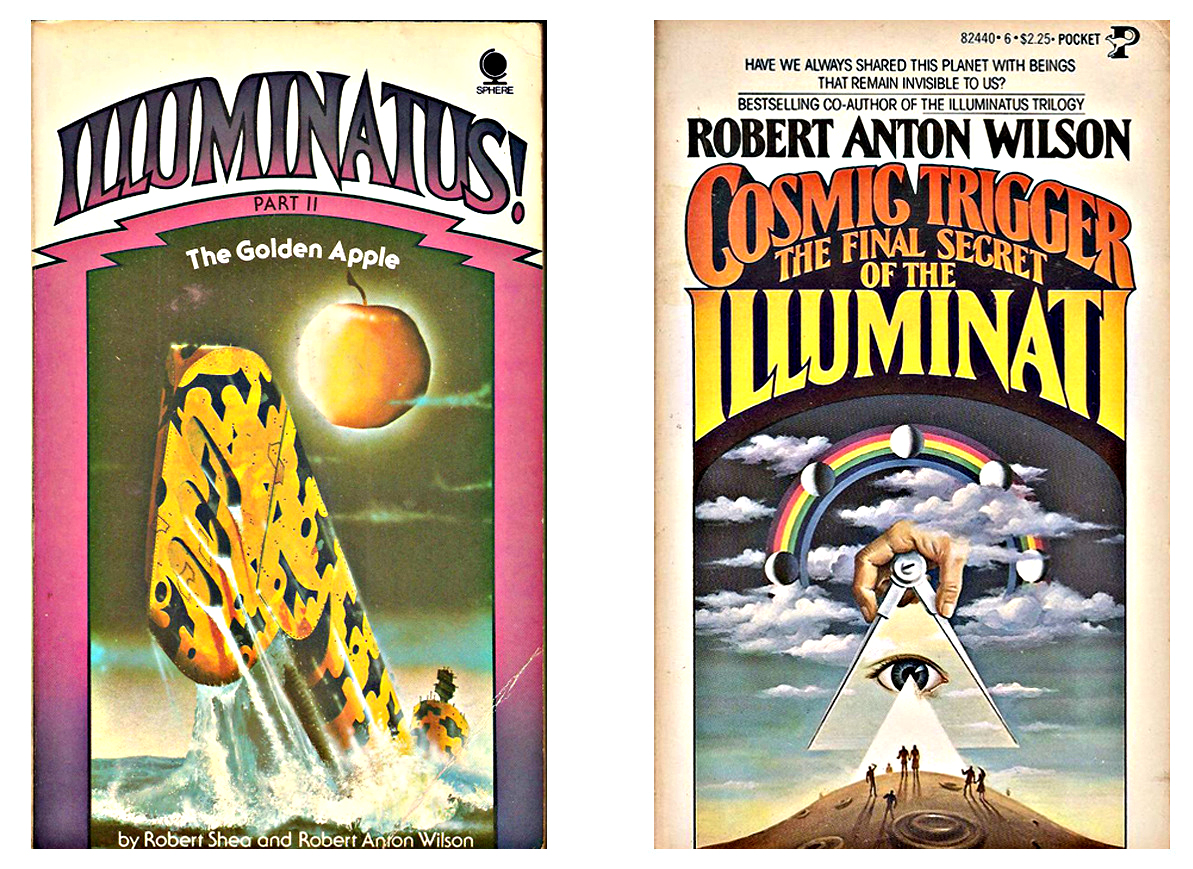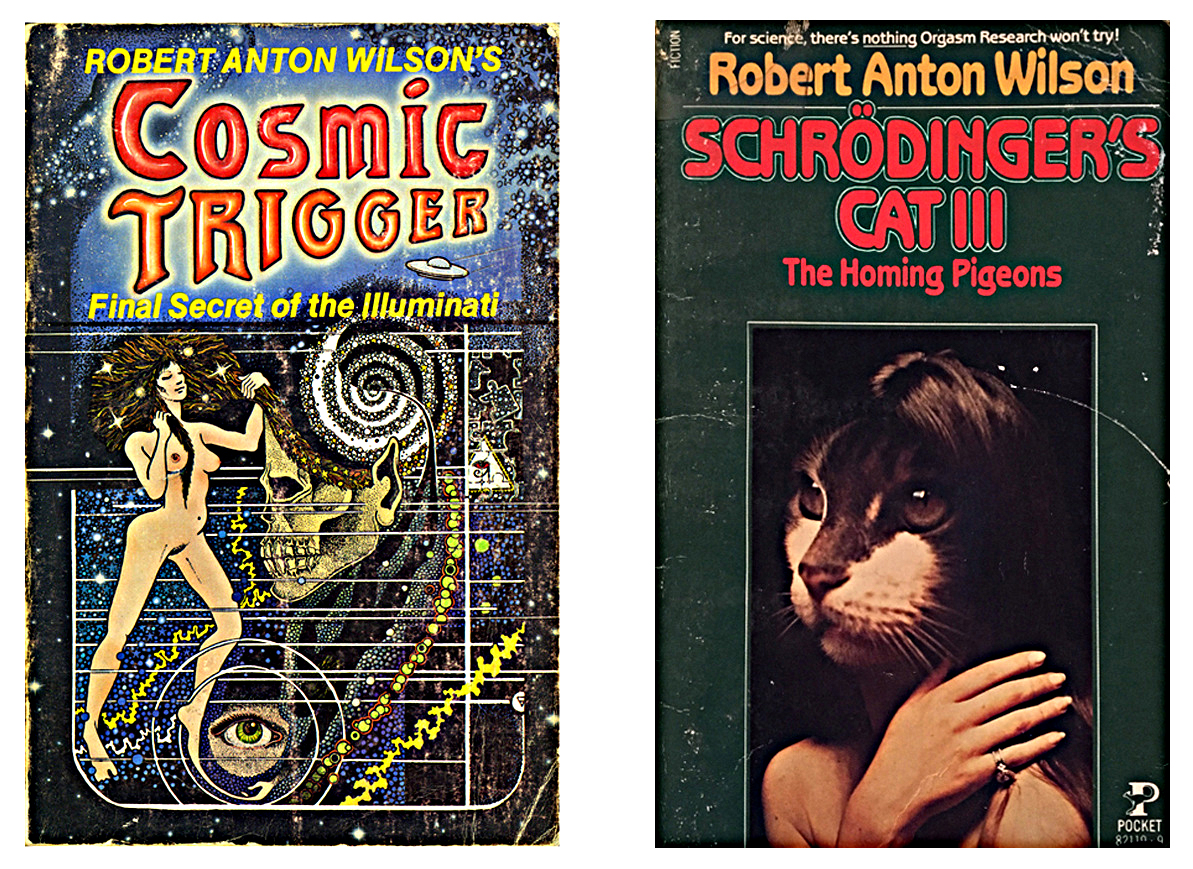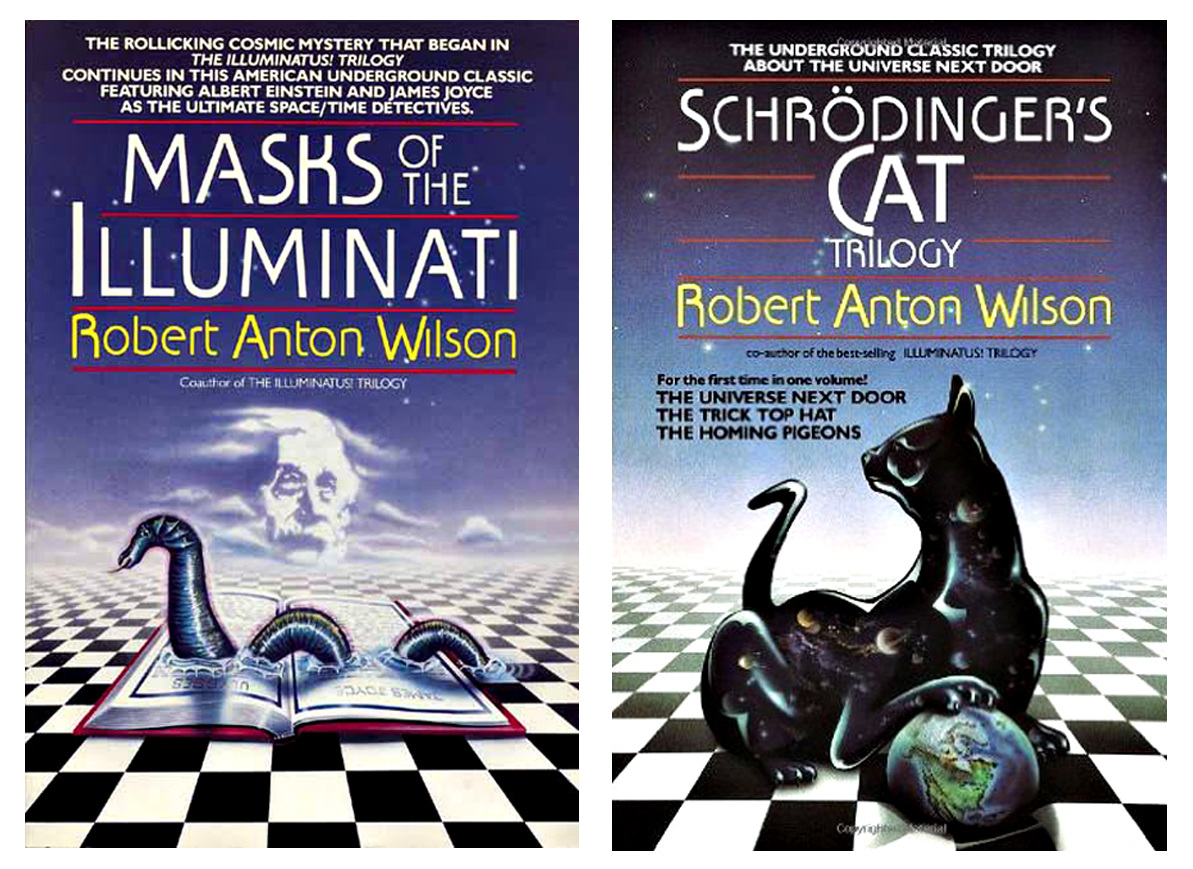robert anton wilson
︎Article, Abstract, Surrealism, Literature
︎ Ventral Is Golden
robert anton wilson
︎Article, Abstract, Surrealism, Literature
︎ Ventral Is Golden
“There are periods of history when the visions of madmen and dope fiends are a better guide to reality than the common-sense interpretation of data available to the so-called ‘normal mind’. This is one such period, if you haven't noticed already.”
– Robert Anton Wilson

How much of reality is created by the words we use to define it has been the question many philosophers have been trying to answer, most predominantly under the terms Linguistic Determinism and Linguistic Relativism. From Ludwig Wittgenstein, who stated that the limit of language was the limit of the world, to Benjamin Lee Whorf, who’s hypothesis described the idea of language not merely as a means of reporting the world, but also of the framing of the world being reported.
Transcendentalist Philosopher Ralph Waldo Emerson also once remakred that language is fossil poetry. As the limestone of the continent consists of infinite masses of shells, so language is made up of images and tropes, which now, in their secondary use, have long ceased to remind us of their poetic origin.
The work of Robert Anton Wilson (who was a poet, playwright, Playboy Magazine contributor, conspiracy theorist, novelist, stand up comedian and contemporary to the likes of Timothy Leary and John C. Lily) focussed largely on these ideas of linguistic relativism and breaking open the cliche through a weaving together of fiction, occultism and mass media propaganda to generate magic-realist narratives that perturbed the hyper-real sense-ratios within his readers. Often referencing experimental studies from the fields of neuro-linguistics, biofeedback and meditation techniques, Wilson coined the term ‘Reality Tunnel’ to describe the effect that language had upon deferring the direct experience of the real.
Transcendentalist Philosopher Ralph Waldo Emerson also once remakred that language is fossil poetry. As the limestone of the continent consists of infinite masses of shells, so language is made up of images and tropes, which now, in their secondary use, have long ceased to remind us of their poetic origin.
The work of Robert Anton Wilson (who was a poet, playwright, Playboy Magazine contributor, conspiracy theorist, novelist, stand up comedian and contemporary to the likes of Timothy Leary and John C. Lily) focussed largely on these ideas of linguistic relativism and breaking open the cliche through a weaving together of fiction, occultism and mass media propaganda to generate magic-realist narratives that perturbed the hyper-real sense-ratios within his readers. Often referencing experimental studies from the fields of neuro-linguistics, biofeedback and meditation techniques, Wilson coined the term ‘Reality Tunnel’ to describe the effect that language had upon deferring the direct experience of the real.
Other writers, such as William Burroughs and Brion Gysin, in their novel ‘The Third Mind’, utilised this idea of interplay between fact and fiction by way of the cut-up technique. This was an attempt to free the reader from the conventional meanings of words, advertisements and newspapers. They also cut up any negative criticisms of their literature too, recreating them as prose poems. (James Joyce, when writing his book Finnegan’s Wake, similarly cut up all the criticism he received, turning it instead into comedy in one of the book’s chapters).
Like a map that represents the territory of the dominant psychology as opposed to the actual terrain, the meanings of words too leave out the constantly changing psycho-geographical environments from which they originally arise.
Wilson expanded on his idea of the Reality Tunnel in his book ‘Prometheus Rising’ (1983) by knitting together various occult practices, breathing techniques and mass media stories with the theories of Alfred Korzybski‘s General Semantics, which was concerned with how we translate events into perceptions of reality through linguistic map making.
Like a map that represents the territory of the dominant psychology as opposed to the actual terrain, the meanings of words too leave out the constantly changing psycho-geographical environments from which they originally arise.
Wilson expanded on his idea of the Reality Tunnel in his book ‘Prometheus Rising’ (1983) by knitting together various occult practices, breathing techniques and mass media stories with the theories of Alfred Korzybski‘s General Semantics, which was concerned with how we translate events into perceptions of reality through linguistic map making.

There is an essence of reality contained within languages such as Chinese, Sanskrit and Hebrew that can be considered morphemic as they preserve meaning at their smallest word units, where in contrast, the Romance languages are abstracted into phonetics, which either have no meaning or their original meaning is obscured. The Chinese symbol for intelligence for example, is the symbol for the sun and moon. In english we say a student is bright or dull when one of the aspects of intelligence is overpowered by its naturally arising counterpart and is measured inside of a social criteria for measuring. This is one example of how a word can act as a fossilised poem by having its origin pass through an observation made about a natural phenomena, to being recorded as an abstract sound and then written into a symbol who’s meaning is understood as a social convention.
To overcome this kind of ‘reality tunnel’, in one of Anton Wilson’s books, ‘Quantum Psychology’, he took great lengths to write in E-Prime, a type of english that doesn’t include declarative statements about the world, where statements or words such as ‘is’ or ‘to be’ are consciously left out of the printed pages to emphasise the notion that reality for the reader is not fixed but inherited by their relationship to the language.
It is an irreducible interplay between subject and object that becomes part of the process in deconstructing the meta-programming of the human bio-computer and the feedback loop that has been such a prevalent tool in disinformation campaigns since the inaugeration of the alphabet. In his ‘Schödinger’s Cat Trilogy’, Wilson writes “by the time of the Second World War, the "Double-Cross System" had been invented - by British Intelligence, of course. This was the products of such minds as Alan Turing, a brilliant homosexual mathematician who (when not working in espionage) specialized in creating logical paradoxes other mathematicians couldn't solve, and Ian Fleming, whose fantasy life was equally rich (as indicated by his later James Bond books), and Dennis Wheatley, a man of exceptionally high intelligence who happened to believe that an international conspiracy of Satanists was behind every conspiracy he didn't invent himself. By the time Turing, Fleming, Wheatley and kindred British intellects had perfected the Double-Cross System, the science of lying was almost as precise as Euclidian geometry, and nearly as lovely to the detached observer.”
To overcome this kind of ‘reality tunnel’, in one of Anton Wilson’s books, ‘Quantum Psychology’, he took great lengths to write in E-Prime, a type of english that doesn’t include declarative statements about the world, where statements or words such as ‘is’ or ‘to be’ are consciously left out of the printed pages to emphasise the notion that reality for the reader is not fixed but inherited by their relationship to the language.
It is an irreducible interplay between subject and object that becomes part of the process in deconstructing the meta-programming of the human bio-computer and the feedback loop that has been such a prevalent tool in disinformation campaigns since the inaugeration of the alphabet. In his ‘Schödinger’s Cat Trilogy’, Wilson writes “by the time of the Second World War, the "Double-Cross System" had been invented - by British Intelligence, of course. This was the products of such minds as Alan Turing, a brilliant homosexual mathematician who (when not working in espionage) specialized in creating logical paradoxes other mathematicians couldn't solve, and Ian Fleming, whose fantasy life was equally rich (as indicated by his later James Bond books), and Dennis Wheatley, a man of exceptionally high intelligence who happened to believe that an international conspiracy of Satanists was behind every conspiracy he didn't invent himself. By the time Turing, Fleming, Wheatley and kindred British intellects had perfected the Double-Cross System, the science of lying was almost as precise as Euclidian geometry, and nearly as lovely to the detached observer.”
These ‘Strange Loops’ in the dynamic interplay of reality and illusion annihilates all distance and sustains the fantasy.
The illusion, from the root latin word ‘lude' meaning ‘to play’, has an important role in how we communicate and when spread across wide areas becomes a kind of interface through which we can apprehend a pattern in the chaotic rhythms of reality.
Play, allows us to allude to the essence of something. This is how we acquire an understanding based on our intention to create meaning. Although it doesn’t get us any closer to absolute reality, our understanding places us metaphorically under something of our own making.
When the illusion works too well the tendency is to forget that it was originally created, and that participation had to take place for its continuing creation. For Wilson, instead of realising that we are in the midst of a playful illusion, we build words to reflect notions of stability that are particular to how reality appears to us through sedentary and uniformitarian social values.
In truth, reality seems not to be fixed, but assumed. It doesn’t appear to us how it is, but how we are.
Realising this, Wilson preferred to use the word ‘gloss’ in place of ‘reality’, to evoke the sense of a veiled spectre, a thin layer of understanding that stood between ourselves and how we conceive our worlds.
The illusion, from the root latin word ‘lude' meaning ‘to play’, has an important role in how we communicate and when spread across wide areas becomes a kind of interface through which we can apprehend a pattern in the chaotic rhythms of reality.
Play, allows us to allude to the essence of something. This is how we acquire an understanding based on our intention to create meaning. Although it doesn’t get us any closer to absolute reality, our understanding places us metaphorically under something of our own making.
When the illusion works too well the tendency is to forget that it was originally created, and that participation had to take place for its continuing creation. For Wilson, instead of realising that we are in the midst of a playful illusion, we build words to reflect notions of stability that are particular to how reality appears to us through sedentary and uniformitarian social values.
In truth, reality seems not to be fixed, but assumed. It doesn’t appear to us how it is, but how we are.
Realising this, Wilson preferred to use the word ‘gloss’ in place of ‘reality’, to evoke the sense of a veiled spectre, a thin layer of understanding that stood between ourselves and how we conceive our worlds.
"Who is the great magician that makes the grass green?" - Robert Anton Wilson.




Further Reading ︎
Thinking Allowed, interview with Jeffery Mishlove, video
Buy The ticket Take The Ride, Hunter S Thompson, Documentary
The Cosmic Trigger, Robert Anton Wilson, pdf book
Predicting the Internet with Marshall McLuhan, interview